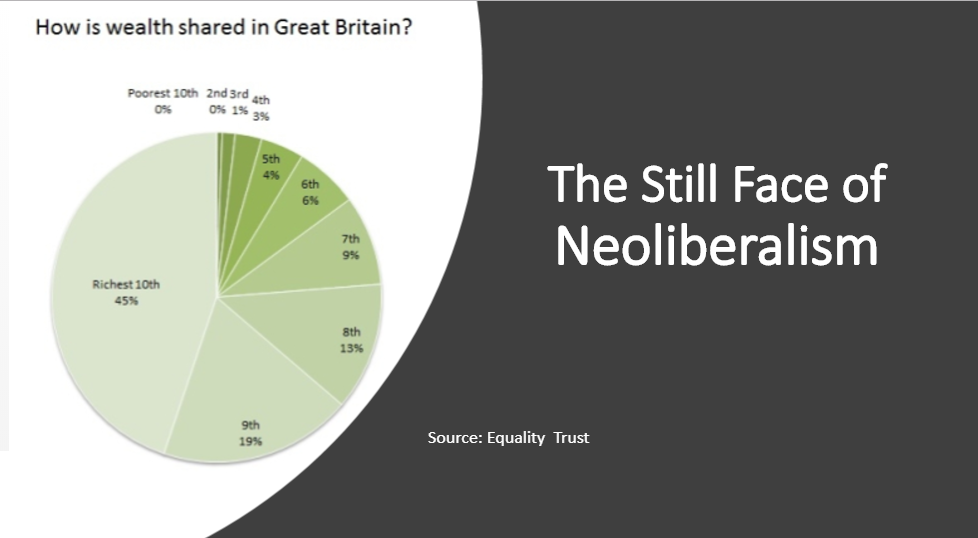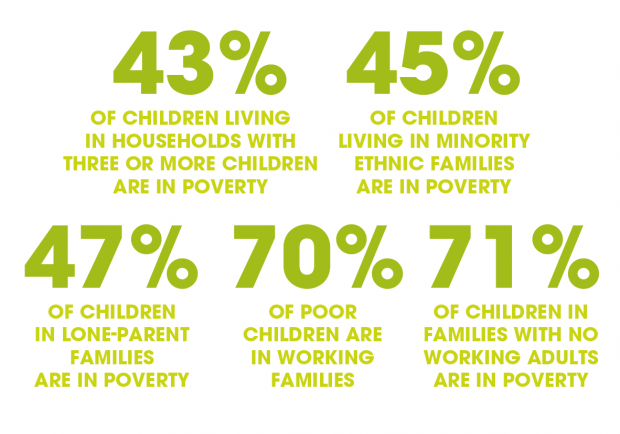
Slide from my presentation on neoliberalism, the still face paradigm and poverty at Beyond the Therapy Room psychology conference, 2019.
According to new research, an unprecedented rise in infant mortality in England is linked to poverty, according to new research. An additional 570 infant deaths, compared to what would have been expected based on historical trends, were recorded in the country from 2014-2017. Around one-third of those deaths, which related to children under the age of one, were linked to rising poverty.
The results of the new study by researchers from the University of Liverpool, University of Leeds and Newcastle University, which analysed data from 2000-2017, have now been released. In their report, published in BMJ Open, the researchers note that infant mortality rates often act as an indicator of the changing overall health of societies, as well as an early warning system for future adverse trends.
Rising infant mortality is unusual in wealthy, high income countries, and international statistics show that infant mortality has continued to decline in most wealthy countries in recent years.
But in England, social security cuts in the last decade have taken their toll on the poorest communities.
In the study, the researchers grouped 324 local authorities into five categories (quintiles) based on their level of income deprivation, with Quintile 1 being the most affluent and Quintile 5 the most deprived.
Inferential testing – using a statistical model – was used to quantify the association between regional changes in child poverty and infant mortality during the same period.
The researchers found that “a sustained and unprecedented rise” in infant mortality in England from 2014-2017 was not experienced evenly across the population.
In the most deprived local authorities, the previously declining trend in infant mortality had reversed and mortality increased. This led to an additional 24 infant deaths per 100,000 live births per year, relative to the previous trend.
There was no significant change from the pre-existing trend in the most affluent local authorities. As a result, inequalities in infant mortality increased, with the gap between the most and the least deprived local authority areas widening by 52 deaths per 100,000 births.
Overall from 2014-2017, there were a total of 572 “excess infant deaths” compared to what would have been expected based on historical trends, the report says.
The researchers estimate that each 1% increase in child poverty was significantly associated with an extra 5.8 infant deaths per 100,000 live births.
The findings suggest that about one-third of the increases in infant mortality between 2014 and 2017 may be attributed to rising child poverty, equivalent to an extra 172 infant deaths.
Professor David Taylor-Robinson of the University of Liverpool, the lead author on the research, said the study “provides evidence that the unprecedented rise in infant mortality disproportionately affected the poorest areas of the country, leaving the more affluent areas unaffected”.
“Our analysis also linked the recent increase in infant mortality in England with rising child poverty, suggesting that about a third of the increase in infant mortality from 2014-17 may be attributed to rising child poverty.
“These findings are really concerning given that child poverty is rising. It is time for the government to reverse this trend establishing a welfare system that protects children from poverty.”
Taylor-Robinson said child poverty has “a myriad of adverse impacts on other aspects of child health that will have repercussions for decades to come”.
“In the context of increasing health inequalities in England, policies that reduce poverty and social inequalities are likely to reduce the occurrence of infant mortality and that of many other adverse child health outcomes,” he added.
Cuts to social security
The report notes the impact of “sustained reductions” in social security benefits in England in the last decade. It states:
“Since 2010, there have been sustained reductions in the welfare benefits available to families with children, including the abolition of child benefit and child tax credit for the third child or more; reductions in the value of tax credits and below-inflation up-rating of most working-age benefits; housing benefit reforms including the under occupancy charge (most commonly referred to as ‘bedroom tax’) and introduction of universal credit; and household caps on total benefit receipt (regardless of how many children are in the household).
“These welfare changes have disproportionately affected the most deprived local authorities and regions and have led to a rise in child poverty.”
Dr Paul Norman of the University of Leeds, who also worked on the research, noted that the findings show “an unprecedented rise in the deaths of children under one year of age”.
He said the researchers’ next step is “to examine the gestational age and the number of weeks at which infants die, to learn more about when key interventions may be needed or when they are being missed”.
“This will inform the urgent action needed by national and local governments, and help drive the health and social care policies needed to reduce infant mortality rates,” Norman said.
The facts and figures from the Child Poverty Action Group (CPAG) show the reality of child poverty in the UK, and which groups are affected most:
Related
Studies find higher premature mortality rates are correlated with Conservative governments
Austerity is “economic murder” says Cambridge researcher
Suicides reach a ten year high and are linked with welfare “reforms”
Conservative governments are bad for your health
I don’t make any money from my work. But you can support Politics and Insights and contribute by making a donation which will help me continue to research and write informative, insightful and independent articles, and to provide support to others. The smallest amount is much appreciated, and helps to keep my articles free and accessible to all – thank you.



Reblogged this on Declaration Of Opinion.
LikeLike
The Tories have deliberately tried to turn the Working Class back to the Victorian era. What next, Workhouses for the poor?
LikeLike
Reblogged this on Tory Britain!.
LikeLike
Reblogged this on Nathan Lee Davies and commented:
#VOTELABOUR2019 #JC4PM2019
LikeLiked by 1 person
Have just finished another session of phone canvassing. It’s SO disheartening as most people are voting according to their feelings about Brexit – not giving other issues any thought or value, such as the effects of Austerity on working class families.
And when I mention them – they’re not interested. Only Brexit matters to them.
LikeLike
That’s strange, Brexit is way down my list of priorities, and pretty much everyone I talk to in person are of the same opinion in so much as the main number one priority of this election is to get rid of the Tories. Admittedly I’m not in touch with all that many people these days but all the rest of the volunteers at my local foodbank are backing Jeremy Corbyn’s fantastic Manifesto and desperately want the Tories out asap.
LikeLiked by 1 person
It’s real, painful outcome of Neoliberalism
LikeLike